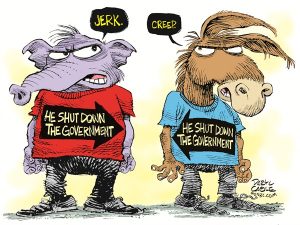
My two children are adults. They almost always seem to have reasonable views on social and political issues, and they vote. They have no desire to be attached to any political party, and I suspect that there are many millennials and other young people who find both parties unattractive. It is not hard to see why.
At one point, when my son was finishing high school, I was discussing with him some of the challenges that led to the creation of this web site (especially that our elected government often makes bad choices for political reasons, and that effective government is often impeded by politics). He said, essentially, that he thought the biggest problem for our country is the two-party system.
Both of my children believe in meritocracy, that is, the ideal in which the best ideas win and the people who are elected or promoted, as the case may be, are those who are the most capable. Many of their ideas are not far from some of the principles of Objectivism expressed by the philosopher/author Ayn Rand: That people should be responsible for their own well being and should be rewarded based on what they are able to do. Political parties, along with many other institutions, contradict this philosophy because they reward membership, loyalty, and adherence to doctrine rather than contributions to their own well being or those of others.
My wife and I did not teach them this. They became this way by growing up as intelligent children with good values in an environment where politicians rise by attacking others, where one of our most intelligent leaders read “Green Eggs and Ham” in a marathon effort to try to shut down the United States government. Since they know that people are good, there had to be something wrong with our system.
The U.S. constitution does not mention political parties. Nor does the Chinese constitution, or the current Russian constitution. Political parties create themselves as a way for the elite to consolidate power. In China and Russia, the idea was that the communist party was to represent the workers. In the U.S., our political parties started as a rough grouping based on ideas about how strong the central government should be, then were reborn around the central issues of slavery and the industrial/agrarian economies and have continued to evolve from that division (the parties flip-flopped between Franklin Roosevelt and Richard Nixon as the deep south went from being entrenched Democrats to entrenched Republicans).
Fortunately, for us, in spite of our divisiveness, we have more than one political party; otherwise we might feel even more powerless and ineffectual. But that leaves us just one party better. If we don’t like the candidate for either party (or from the one party that dominates politics in our area), we are still stuck with what they do. Even worse, parties, like all institutions, concentrate and perpetuate their own power. So they have their own fundraising engines and dole out their own rewards. It’s very hard to get elected without the support of a party, and it’s impossible to get much power in congress. President Obama tried to upend the party system by “reaching across the aisle” and it did not succeed – the Affordable Care Act passed without Republican votes. President Trump has also tried to purge the Republican party, but the only major piece of legislation passed so far during his term, the Tax Cut and Jobs Act, is mainstream Republican doctrine that passed without a single Democratic vote (and nearly every Republican vote).
